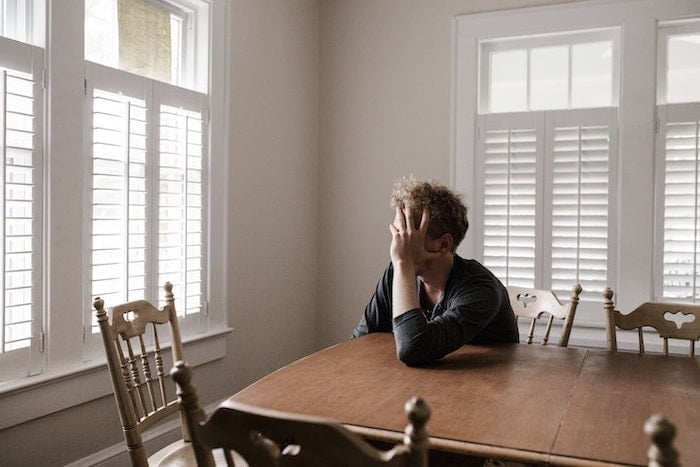Dual Diagnosis: Grief
Quick links for dual diagnosis and grief
- Understanding Grief
- How Grief Causes Addiction
- Seeking Treatment for Addiction and Co-Occurring Grief
- References for grief and addiction
We all experience grief at some point in our lives, but personal circumstances mean that everyone recovers at different speeds.
When people struggle to come to terms with their grief, it is not uncommon for some to turn to substances as a means of coping, including everything from legally obtainable substances such as alcohol and prescription drugs, to illegal substances like cocaine, cannabis and opioids.
Prolonged grief accompanied by regular substance use can lead to addictions, which are very difficult to break free from.
When addiction occurs alongside grief, it is referred to as a co-occuring disorder or dual diagnosis.
Understanding Grief

Two men discussing grief and addiction
Change is a part of life, and many changes come with a degree of loss, which can then produce feelings of grief. Most people first experience grief at a young age, from the loss of grandparents or pets, falling out with friends, or even when changing schools.
In most situations, feelings of grief are fleeting and many people overcome them quite quickly. However severe loss, such as the death of a close family member, often produces extreme feelings of sadness and pain, and many people continue to experience moments of grief even years later.
There is a well-established relationship between grief and addiction, as one often leads to another. [1]
When feelings are painful and difficult to come to terms with, it is common for people to turn to substance use as a means of distraction.
Alcohol, being a central nervous system depressant, can cause feelings of numbness and detachment, which some people seek out when they don’t want to confront negative feelings. However, excessive or prolonged substance use can lead to health problems and even death, which then produces yet more grief.
The most obvious cause of grief is the death of a loved one, but it can be caused by any kind of tragedy or loss.
For example, athletes who lose the ability to compete through injury, age, or illness often also experience grief.
Other causes include:
- The loss of a loved one through death, divorce, or separation
- Empty nest syndrome, after children leave the family home
- Leaving a job
- Moving to a new place
- Health problems
- Injuries
- Loss of youth, innocence, or vitality
- Loss of faith

Man sat with a therapist suffering from symptoms of grief
The symptoms of grief are similarly varied and have a lot in common with the signs of mental health issues like depression and anxiety.
They include:
- Uncontrollable crying
- Emotional sensitivity
- Mood swings
- Numbness or apathy
- A change in eating habits – from binge eating, to hardly eating at all
- Self-harm
- Suicidal thoughts
- Isolation
- Feelings of loneliness and abandonment
- Feeling guilty
- Difficulty sleeping
- Deflection or avoidance
- Difficulty concentrating
- Becoming hyper-fixated on work or a new project
- Feeling hopeless, purposeless, directionless
Most people feel any combination of these symptoms after a loss or trauma but will usually find that they begin to feel better with time. However, for some people, these symptoms only become more severe and can remain for months or even years.
This can be a case of persistent complex bereavement disorder, [2] commonly known as ‘complicated grief’.
Complicated grief is most commonly seen in people who have lost close family members or friends, and find it difficult to move on.
Elisabeth Kübler-Ross’ “5 Stages of Grief” [3] is a well-known theory that suggests that each person who experiences grief processes it in five distinct stages:
- Denial
- Anger
- Bargaining
- Depression
- Acceptance
Most people currently live in a state of acceptance, having grieved a tragedy earlier in life. During this stage, they may still experience pangs of grief when reminded of their loss, but these don’t interrupt their lives.
For people with complicated grief, they tend to remain stuck in depression, and acceptance may feel unattainable.
An extended low period such as this is where addictions and harmful behaviour can thrive, and quickly spiral out of control.
How Grief Causes Addiction

Person holding their head whilst suffering from grief and addiction
Grief is considered to be a normal part of life and, outside of complicated grief, it is not generally diagnosed as its own psychological condition. However, because it is so common, it is often trivialised.
The expectation that people will naturally move on from a loss means that they are not always taken seriously or encouraged to seek support.
Many people do need help to overcome their grief, which begins with understanding it and how it impacts our behaviour.
One of the most damaging behaviours that often stems from grief is self-medication. This is where someone attempts to repress negative feelings by consuming mood-altering drugs or excessive amounts of alcohol.
It is often used as a means of self-comfort when someone feels that they cannot seek outside support.
Unfortunately, due to the nature of many abused substances, they make it difficult to gauge when self-medicating can stop.
Alcohol, in particular, can cause depression-like symptoms and can trick those who were grieving into thinking that they are still not over their loss, when in reality it is the alcohol that is causing their low mood.
Due to this, self-medication can easily become a habit, which then develops into an addiction.
Still, using drugs and alcohol can seem like the easiest option when dealing with grief.

Two women having a serious discussion about grief and addiction
Because it isn’t its own disorder, there is usually no concrete diagnosis to be made, and therefore no clear-cut cure. This means that many people don’t see the point in pursuing medical treatment.
In actuality, there are treatment options available [4] when you’re trying to overcome grief. What’s more, if you have developed a co-occurring addiction, there are specialist treatments that will tackle both problems together.
It’s unknown why some people will overcome grief quite quickly, while around 7% will develop a condition like persistent complex bereavement disorder. [5]
Even someone without a history of mental health problems can experience complicated grief, and it can be scary to both experience and see a loved one go through.
Getting support early on, before substance use or complicated grief can develop, is therefore key.
Seeking Treatment for Addiction and Co-Occurring Grief

Patient talking with a specialist about grief and addiction at a rehab clinic
When grief has resulted in substance addiction, it is necessary to find a rehabilitation centre that is experienced in treating co-occurring conditions.
If the addiction is treated in isolation, with the related grief going untouched, then a person may be lured back into addiction once the feelings of grief re-emerge.
Fortunately, many of the treatments for grief are also widely used to treat addiction.
This means that you should not need to go far out of your way to seek treatment for yourself or your loved one.
Most rehabilitation treatment plans begin with a medically assisted detox. When someone has been addicted to drugs or alcohol for a while, they can experience unpleasant physical withdrawal symptoms if they suddenly stop using them.
In extreme cases, drug withdrawals can result in hospitalisation and even death.
There is no single medication that is recommended for the treatment of grief. In some cases, it might not be appropriate for any prescription to be made, particularly if the person has had a previous addiction to prescription drugs.
However, antidepressants can be used in conjunction with mental health therapy to combat the low mood that often accompanies grief.

Individual speaking with a therapist about grief and addiction
The most important step in confronting a dual diagnosis of this type is to begin processing the source of grief.
Cognitive Behavioural Therapy (CBT) is a popular talking therapy that examines negative impulses and their underlying causes.
Because it focuses on the relationship between emotion and action, it is an ideal form of therapy for dealing with grief and addiction.
Complicated grief therapy (CGT) [6] is a form of psychotherapy specifically designed for treating complicated grief, though it is similar in nature to Cognitive Behavioural Therapy.
It can be challenging, as it involves talking in-depth about the loss, but aims to counteract any sadness this will produce by supporting individuals to make positive goals and improve personal relationships.
Family therapy is an excellent treatment option for co-occurring grief and addiction, particularly when a loss has affected the whole family.
Having a neutral environment, with an impartial therapist, can facilitate communication and help the family to reconnect after a tragedy.
If one or more family members have also been struggling with an addiction, the rest of the family will have an opportunity to share their concerns and encourage their loved ones on the road to recovery.
You can do this by seeking out your best local rehab options.
Give our expert team a call today to begin helping yourself or a loved one away from the cycle of grief and addiction – reach out to us on 0800 326 5559
References for grief and addiction
- https://www.ncbi.nlm.nih.gov/pmc/articles/PMC6383361/
- https://www.psychiatry.org/patients-families/prolonged-grief-disorder
- https://en.wikipedia.org/wiki/Five_stages_of_grief
- https://www.ncbi.nlm.nih.gov/pmc/articles/PMC4530627/
- https://www.ncbi.nlm.nih.gov/pmc/articles/PMC3384440/
- https://www.ncbi.nlm.nih.gov/pmc/articles/PMC3384444/






